|
Books Should Be Free Loyal Books Free Public Domain Audiobooks & eBook Downloads |
|
|
Books Should Be Free Loyal Books Free Public Domain Audiobooks & eBook Downloads |
|
Science |
|---|
|
Book type:
Sort by:
View by:
|
By: Frederick Schwatka (1849-1892) | |
|---|---|
 In the Land of Cave and Cliff Dwellers
In the Land of Cave and Cliff Dwellers
An adventurer and explorer of no mean repute, Lieutenant Frederick Schwatka leads an expedition by mule train into the forbidding Sierra Madre mountains of Mexico to one of the richest silver mining regions in the world. He offers lively descriptions of the the unfamiliar flora and fauna of this often desolate region, of the cliff and cave dwellings inhabited and abandoned, and of the social customs of the various peoples he meets. He marvels at the unmatched running prowess of the Rarámuri Indians of the Barranca del Cobre--the famous Copper Canyon of Chihuahua State. He writes always with humor that keeps the narrative light and the reader smiling. | |
By: Frederik Pohl | |
|---|---|
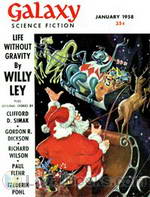 The Knights of Arthur
The Knights of Arthur
Sailors Sam Dunlap and Arthur check in to a New York hotel to await their mate Vern Engdahl when a girl shows up proposing to purchase Arthur. They need guys like Arthur to help run the city, and the fact that he fits in a small suitcase is even better. – The Knights of Arthur was first published in the January 1958 edition of Galaxy Science Fiction magazine. | |
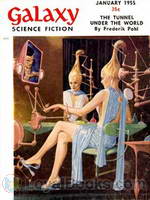 Tunnel Under The World
Tunnel Under The World
This famous Pohl story explores cybernetic robots and implanted personalities in a way that certainly expanded my way of looking at reality. Is that wall really real? or is it just kinda, sorta real? And who am I? The protagonist, Guy Burckhardt, wakes up screaming from a horrible dream of explosions, searing fire, choking gas and other terrible ways to die. But he wakes up so it must have been just a bad nightmare, right? To find out that piece of information you will need to listen to this inventive and scary story. | |
By: Fridtjof Nansen (1861-1930) | |
|---|---|
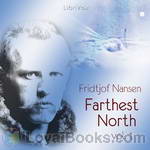 Farthest North
Farthest North
Being the Record of a Voyage of Exploration of the Ship "Fram", 1893-96 and of a Fifteen Months' Sleigh Journey by Dr. Nansen and Lieut. Johansen / by Fridtjof Nansen; with an Appendix by Otto Sverdrup | |
By: Friedrich Engels (1820-1895) | |
|---|---|
 Condition of the Working-Class in England in 1844
Condition of the Working-Class in England in 1844
This is Engels' first book (since considered a classic account of England's working class in the industrial age), which argues that workers paid a heavy price for the industrial revolution that swept the country. Engels wrote the piece while staying in Manchester from 1842 to 1844, based on th bohis observations and several contemporary reports conducted over the period. | |
By: Friedrich Nietzsche (1844-1900) | |
|---|---|
 Early Greek Philosophy and Other Essays
Early Greek Philosophy and Other Essays
The essays contained in this volume treat of various subjects. With the exception of perhaps one we must consider all these papers as fragments. Written during the early Seventies, and intended mostly as prefaces, they are extremely interesting, since traces of Nietzsche's later tenets — like Slave and Master morality, the Superman — can be found everywhere. But they are also very valuable on account of the young philosopher's daring and able handling of difficult and abstruse subjects. "Truth and Falsity," and "The Greek Woman" are probably the two essays which will prove most attractive to the average reader. - from the Preface. | |
 Birth of Tragedy
Birth of Tragedy
In this famous early work of German philosopher Friedrich Nietzsche, he investigates the artistic characteristics of Apollonian and Dionysian characteristics in Greek art, specifically in Greek tragedy as it evolved. Then he applies his conclusions about Greek tragedy to the state of modern art, especially modern German art and specifically to the operas of Richard Wagner. | |
By: Fritz Leiber (1910-1992) | |
|---|---|
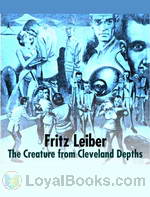 The Creature from Cleveland Depths
The Creature from Cleveland Depths
“The Creature from Cleveland Depths” also known as “The Lone Wolf” tells the story of a writer and his wife who refuse to move below-ground after the cold-war gets hot. The underground society discovers a decline in their ability to creatively innovate, and must consult with surface dwellers to develop products that satiate the needs of a people living like moles. But the latest product to result from this alliance, “The Tickler” has frightening implications that only our heroes seem to notice. – This story appeared in the December, 1962 issue of “Galaxy” magazine. | |
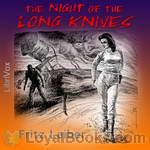 The Night of the Long Knives
The Night of the Long Knives
"I was one hundred miles from Nowhere—and I mean that literally—when I spotted this girl out of the corner of my eye. I'd been keeping an extra lookout because I still expected the other undead bugger left over from the murder party at Nowhere to be stalking me." In a Post apocalyptic world, the few people left must be strong. And must not hesitate to kill. Of course, killing another Deathlander was one of the chief pleasures and urges of all the solitary wanders in this vast wasteland. Kill and kill again. But this other was a girl and that brought up the second great urge: sex. Which was it to be today? Perhaps both? | |
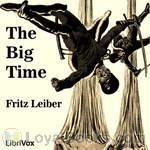 The Big Time
The Big Time
A classic locked room mystery, in a not-so-classic setting. (Intro by Karen Savage) | |
 No Great Magic
No Great Magic
They were a traveling group of Shakespearean players; perfectly harmless, right? Wrong. For one thing, why did they have spacemen costumes in their wardrobes, right next to caveman ones? Why was the girl in charge of backstage suffering from amnesia and agoraphobia? No Great Magic is needed to perform the plays they put on, but sometimes great science. No matter where, or when. | |
 Three Science Fiction Stories by Fritz Leiber
Three Science Fiction Stories by Fritz Leiber
The Moon is Green, Bread Overhead and What's He Doing In There?! Three of the best known and loved Science Fiction short stories by the wonderful Fritz Lieber. Always tongue in cheek, and always with a funny twist, Leiber deftly shows how humans will adapt to or mess up the future. In ways that only humans can. | |
By: G. K. Chesterton | |
|---|---|
 Eugenics and Other Evils
Eugenics and Other Evils
Most Eugenists are Euphemists. I mean merely that short words startle them, while long words soothe them. And they are utterly incapable of translating the one into the other, however obviously they mean the same thing. Say to them “The persuasive and even coercive powers of the citizen should enable him to make sure that the burden of longevity in the previous generation does not become disproportionate and intolerable, especially to the females”; say this to them and they will sway slightly to and fro like babies sent to sleep in cradles. Say to them “Murder your mother,” and they sit up quite suddenly. Yet the two sentences, in cold logic, are exactly the same.” | |
By: G. L. Vandenburg | |
|---|---|
 Four Science Fiction Stories by G.L.Vandenburg
Four Science Fiction Stories by G.L.Vandenburg
G.L.Vandenburg wrote quirky and funny Science Fiction stories for Amazing Science Fiction Stories, and similar magazines in the 1950's. These four are a selection that give a good taste of his offbeat approach, strange sense of humor and relaxed narrative style that brought joy and excitement to those of us who bought these magazines and saw his name on the cover. In the first, Martian V.F.W., some strange visitors join a parade; in the second, Jubilation, U.S.A, our first visitors from outer space... | |
By: Gabriel Tarde (1843-1904) | |
|---|---|
 Underground Man
Underground Man
This post-apocalyptic novella tells the story of the downfall of civilisation and mankind following a solar cataclysm in the late 20th century. To survive, the remnants of humanity had to build a new civilization underground in the complete absence of all species except mankind, choosing to base it only on love and beauty, the fine arts and intellectual pursuits. In view of the sun's current inactivity, this frighteningly prophetic tale might have been written today, saving that the cultural references and the fluid prose might be beyond, if one dares say so, many modern writers... | |
By: Garrett P. Serviss (1851-1929) | |
|---|---|
 Edison's Conquest of Mars
Edison's Conquest of Mars
Edison’s Conquest of Mars, by Garrett P. Serviss, is one of the many science fiction novels published in the nineteenth century. Although science fiction was not at the time thought of as a distinct literary genre, it was a very popular literary form, with almost every fiction magazine regularly publishing science fiction stories and novels. “Edison’s Conquest of Mars” was published in 1898 as an unauthorized sequel to H. G. Wells’s The War of the Worlds, but did not achieve the fame of its predecessor. The book was endorsed by Thomas Edison, the hero of the book — though not by Wells. | |
By: Gaston Maspero (1846-1916) | |
|---|---|
 Manual of Egyptian Archaeology and Guide to the Study of Antiquities in Egypt
Manual of Egyptian Archaeology and Guide to the Study of Antiquities in Egypt
A handbook of Egyptian archaeology, issued by the British Museum, considered suitable for British tourists travelling to Egypt in the 19th Century. (Introduction by Timothy Ferguson) | |
By: Gene Stratton-Porter (1863-1924) | |
|---|---|
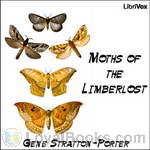 Moths of the Limberlost
Moths of the Limberlost
Gene Stratton-Porter was an American author, amateur naturalist, wildlife photographer, specializing in the birds and moths in one of the last of the vanishing wetlands of the lower Great Lakes Basin. The Limberlost and Wildflower Woods of northeastern Indiana were the laboratory and inspiration for her stories, novels, essays, photography, and movies. She was an accomplished author, artist and photographer and is generally considered to be one of the first female authors to promulgate public positions; conserving the Limberlost Swamp in her case... | |
 Song of the Cardinal
Song of the Cardinal
The Song of the Cardinal is about a big male Cardinal who lives in a tree near a farmer and his wife. The Cardinal immediately starts to sing to find himself a mate. Meanwhile the farmer and his wife enjoy watching this boisterous bird and seeing what he does. He does find a mate and through his singing the farmer and his wife's marriage is rejuvenated. It's a happy little parallel love story that will sweep you off your feet! | |
By: George Frederick Kunz (1856-1932) | |
|---|---|
 Curious Lore of Precious Stones
Curious Lore of Precious Stones
Full title is "The Curious Lore of Precious Stones, being a description of their sentiments and folklore, superstitions, symbolism, mysticism, use in medicine, protection, prevention, religion, and divination, crystal gazing, birthstones, lucky stones, and talismans, astral, zodiacal, and planetary." Just about everything you ever wanted to know about precious stones, aside from their formation, acquisition, and chemical composition. - Summary by TriciaG | |
By: George Griffith (1857-1906) | |
|---|---|
 Honeymoon in Space
Honeymoon in Space
| |
By: George Iles (1852-1942) | |
|---|---|
 Little Masterpieces of Science - The Skies and The Earth
Little Masterpieces of Science - The Skies and The Earth
The Skies and the Earth is another in the series Little Masterpieces of Science edited by George Iles and published in 1902. It includes essays on the Sun, Astronomy, Geological Change on Earth, Rivers, the Sea and Earthquakes and Volcanoes by eminent scientists of the 19th Century. - Summary by J. M. Smallheer | |
 Little Masterpieces of Science - Mind
Little Masterpieces of Science - Mind
Another in the series "Little Masterpieces of Science" edited by George Iles, Mind is a collection of articles and book chapters that provide insight into the study of the workings of the mind the nineteenth century. - Summary by J.M. Smallheer | |
By: George M. Sternberg (1838-1915) | |
|---|---|
 Infection and Immunity
Infection and Immunity
Infection and Immunity with Special Reference to the Prevention of Infectious Diseases presents a subject that is as relevant today as it was in 1903. This book was written for readers without a medical background, and includes general information on infectious disease, as well as specific diseases prevalent at the time. To quote the author, who served as the U.S. Army Surgeon General from 1893-1902, "The general statement may be made that all infectious disease are preventable disease, and at the present time it is possible to indicate the necessary measures of prevention for nearly all of these diseases... | |
By: George Sutherland (1855-1905) | |
|---|---|
 Twentieth Century Inventions: A Forecast
Twentieth Century Inventions: A Forecast
This work from 1901 predicts what technological developments will manifest in the twentieth century. The author, a technical journalist, presents ideas for inventions and new developments in the areas of power, transportation, agriculture, mining, domestic applications, electronic devices, warfare, music, art, and news. Many have come to pass. All of them provide an interesting look into how the next century was imagined and what challenges were anticipated for the progress of society. - | |
By: George Vivian Poore (1843-1904) | |
|---|---|
 London (Ancient And Modern) From The Sanitary And Medical Point Of View
London (Ancient And Modern) From The Sanitary And Medical Point Of View
This little book is an expansion of two addresses delivered in January, 1889. One deals with sanitary issues in London. The other deals with medical issues, mainly through the lives and careers of physicians. Though ancients are included, the main emphasis is upon the sixteenth through nineteenth centuries. - Summary by Book Preface and David Wales | |
By: George Wharton James (1858-1923) | |
|---|---|
 What the White Race May Learn from the Indian
What the White Race May Learn from the Indian
People learn from other people, and races have forever learned from other races. Herein we are treated to an in-depth understanding of categorized social characteristics of the Native American peoples, primarily those of the western U.S. as they existed at the time of book publication . 'In dealing with [the Native Americans] as a race, a people, therefore, I do as I would with my own race, I take what to me seem to be racial characteristics, or in other words, the things that are manifested in the lives of the best men and women, and which seem to represent their habitual aims, ambitions, and desires.' - Summary by Roger Melin & book foreword | |
By: Gerald Vance (1916-2013) | |
|---|---|
 Equation of Doom
Equation of Doom
A world weary space pilot on the lam from earth for crimes unspecified; the most beautiful (earthly) tri-D woman in the universe who is determined to be the most powerful too; a planet of crafty and unscrupulous giant frogs intent on kicking out all aliens; and finally beings who live outside of time. Mix them all together and some very interesting things happen. Very interesting. And disastrous. But there's more! Why did 3000 worlds across the galaxy suddenly blossom almost simultaneously with very similar life and intelligence? Could there have been a common ancestor? Well, give or take a million years, simultaneously... | |
 3 Science Fiction Stories by Gerald Vance
3 Science Fiction Stories by Gerald Vance
Three Science Fiction stories by the great Gerald Vance: Monsoons of Death is a very nice blend of horror story and a study of true bravery on the planet Mars. A newly commissioned lieutenant finds out a lot about both! In Larson's Luck, Vance takes us on a light hearted jaun into hot shot space ship pilots, piracy and the good part of breaking the rules. The last story, Vital Ingredient, takes the listener far into the future when the sport of boxing still has two musceled opponents battling it out in a ring, but they are simply puppets, every muscle, feint and jab controlled by ring side 'managers'; ex fighters who have moved up... | |
By: Gertrude Chandler Warner (1890-1979) | |
|---|---|
 Star Stories for Little Folks
Star Stories for Little Folks
Gertrude Chandler Warner, known mainly for her "Boxcar Children" series of mystery books, published this small book of Astronomy, Constellations, and the stories behind them in 1918. It follows the story of a little girl named Helen, and her friend Dr. Lorry as she learns about stars through stories, games, and more. | |
By: Gilbert White (1720-1793) | |
|---|---|
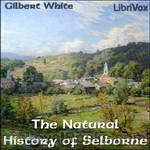 The Natural History of Selborne
The Natural History of Selborne
The Reverend Gilbert White was the curate of the village of Selborne, a village in Hampshire, from 1784 to his death in 1793, living most of his life in the village. The book is in the form of a collection of letters to two friends, discussing the natural history of the areas that he knew, and natural history in general. White’s intense curiosity and his love for the world about him flow through his simple, straightforward style, and a gentle sense of humour colours many of his anecdotes. | |
By: Glenn D. Bradley (1884-1930) | |
|---|---|
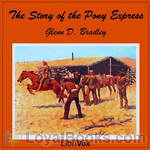 The Story of the Pony Express
The Story of the Pony Express
The Story of the Pony Express offers an in depth account behind the need for a mail route to connect the eastern U.S. with the rapidly populating west coast following the gold rush of California, the springing up of lumber camps, and all incidental needs arising from the settling of the western frontier. Here we learn of the inception of the Pony Express, its formation, successes, failures, facts, statistics, combined with many anecdotes and names of the people who were an integral part of this incredible entity which lasted but less than two years, yet was instrumental in the successful settlement of two thirds of the land mass comprising the expanding country... | |